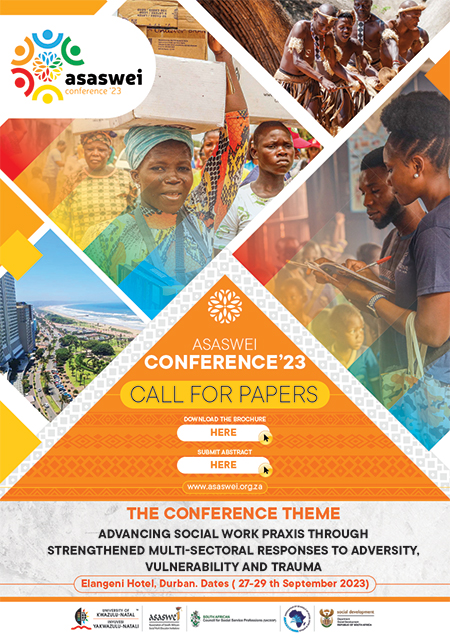The Submissions page displays a customizable overview of a webform's submissions. Submissions can be reviewed, updated, flagged and/or annotated. Watch video
205 submissions
| # Sort descending | Operations | Status | Status | Title | Lastname | Firstname | Institution | Title of Presentatation | Theme Selection | Abstract | |
|---|---|---|---|---|---|---|---|---|---|---|---|
| 205 | Accepted | Accepted | Ms. | Latakgomo | Nthabiseng | [email protected] | University of Johannesburg | Substance abuse and mental health : multi sectoral Approach | THEME 2: Building sustainable, resilient, and self-reliant communities through indigenous modalities, inter-sectoral collaborations, and partnerships | Substance abuse is a global challenge that affects not only the user but the greater society. South Africa is no exception, as it is reported that 15% of the population abuse substances. As a complex phenomenon, I believe it needs an integrated approach to ensure the maximum impact. Social workers are confronted with substance abuse and its effects daily and we are expected to deal with a plethora of problems associated it. There seem to be a misalignment/disjuncture between the increased intervention against drug abuse and the increasing prominence of the drug problem in South Africa. This calls for a multi sectoral approach in order to effectively deal with substance abuse in South Africa. An ecological approach guide by programme theory will best explain how the different systems can be coordinated to effectively deal with substance abuse. |
|
| 206 | Accepted | Pending Review | Prof. | Mathebane | Mbazima Simeon | [email protected] | University of South Africa | DECOLONIALITY AS TOTAL DISENTANGLEMENT WITH MODERN CAPITALIST AND NEO-LIBERAL COMPLEX: A SOCIAL WORK PERSPECTIVE | THEME 4: Quality management and enhancement of social services | Decolonial scholarship is gaining traction and currency in the Global South, particularly in the social and human sciences. A plethora of critical scholars has emerged and thoroughly engaged with the notion of decoloniality as a concept and process from a variety of dimensions that significantly enriched the discourse. The ground swelling of narratives proves ripe for consolidation and actioning. Many in the academy have been questioning the practicability of decoloniality as an epistemic and political movement. Thus it is critically important that the discourse progresses to practical application and actioning. However, there are critical transformative prerequisites at structural and systemic levels for decoloniality to find practical application. Notwithstanding the consensus amongst scholars in the Global South that coloniality emanates from the Euro-North American-centric modernity, not much progress has been registered towards total de-linking with the modern capitalist and neo-liberal complex of global power relations. Meanwhile, the socio-economic, cultural, and political conditions of the present in the Global South not only highlight the endemic problems created by the Euro-North American-centric modernity, but also the extent of ineptitude of theories/knowledges generated from a Euro-North American-centric context to assist in addressing such problems. This conceptual paper presents arguments for a serious engagement and accentuation of political movements including but not limited to a shift in political and economic power from Europe and North America towards a new world order where people of the Global South are at liberty to determine own humanity and realise true pluriversality. This paper introduces, defines, and explains the necessity for total disentanglement with modern capitalist and neo-liberal complex as a critical transformative prerequisite for the future of post-colonial nations. | |
| 207 | Accepted | Accepted | Prof. | Mathebane | Mbazima Simeon | [email protected] | University of South Africa | The influence of the African Worldview on the socialisation of urban African youth: Implications for social work practice. | THEME 4: Quality management and enhancement of social services | The contentious and paradoxical relationship between the silenced African worldview and the dominant European worldview has become a major concern and a source of frustration for various sectors within the African social fabric. The visible effects of enculturation and the resultant sense of identity crisis continue to cause a sense of unease among African parents and various social structures and cultural systems. African parents are faced with various challenges including the valorisation of European/western ways of living at the expense of African ways. The study explored, described and interpreted the influence of the African worldview on the socialisation of black youth among African families in order to distil its implication on social work practice with African youth. The study followed a qualitative research approach. Data were collected through face-to-face interviews with the aid of a semi-structured interview guide while collected data was analysed thematically using Tesch’s eight steps. The findings reveal that discipline and respect are at the centre of cultural socialisation of children in urban African families. It found that there is longstanding battle with enculturation that the African youth is confronted with as they interact with the external environment. The study also found that African cultural socialisation presents challenges and opportunities for the urban African youth. Lastly, two suggestions were advanced for the improvement of social work interventions with urban African youth. Firstly, the need to infuse a developmental approach in youth programmes facilitated with urban African youth and secondly, the need to adopt a framework of cultural relativity and/or sensitivity including cultural socialization when working with urban African youth. | |
| 208 | Accepted | Accepted | Ms. | Sani | Tania | [email protected] | University of Johannesburg | Developmental Social Work in Schools: Using a Community of Practice (CoP) multi-disciplinary approach for early grade learners. | THEME 3: Strategies toward the normative development of society | The Community of Practice for Social Systems Strengthening to Improve Child Wellbeing Outcomes (CoP) study is a community of practice approach that is centred in schools and on early grade (R-3) learners and their families, who are beneficiaries of the Child Support Grant. It exemplifies the application of developmental social work in poor urban communities in Johannesburg and seeks to address the fragmentation of service provision to meet the needs of children and their families in a holistic way. This is a long-standing challenge due to the lack of cooperation and coordination between health, welfare and education sectors serving children and families at a community level. Meeting children’s needs holistically requires an inter-sectoral and transdisciplinary response. This presentation highlights the social work intervention component of the CoP. Combined with the use of a locally developed digital Child Wellbeing Tracking Tool (CWTT) and a partnership with the Gauteng Department of Social Development’s School Social Work unit, it demonstrates how innovative multi-sectoral interventions that intersect with individuals, families, public and community services can be delivered by social workers. In so doing, it makes a valuable contribution to pro-poor developmental social work within a school setting. A mixed methods design was adopted. Data for the study comprises quantitative assessments of child wellbeing, aspects of caregiver wellbeing as well as the overall socioeconomic standing of participating households. Focus groups discussions were also conducted with school social workers subjected to thematic analysis. Following interventions, improvements in access to food , immunization, use of health services and reduction in caregiver depression were observed. Even though high poverty and child safety risks persist, we conclude that CoPs can be an important vehicle for advancing the rights of children and families to social protection and social services in South Africa and many African countries. |
|
| 209 | Accepted | Accepted | Prof. | Mathebane | Mbazima Simeon | [email protected] | University of South Africa | COLONIALITY: A MAJOR HINDRANCE TO EFFECTIVE INTEGRATION OF SOCIAL WORK THEORY INTO PRACTICE | THEME 4: Quality management and enhancement of social services | The disintegration of social work theory and practice has been a topic of concern over recent years. This qualitative study aims to explore the perceptions of social workers on factors hindering their application of social work theory into practice in order to gain an in-depth understanding of this phenomenon. Non-probability, in particular purposive sampling, was applied to select participants for the proposed study. Data was collected through semi-structured face-to-face interviews, noting and recording the responses after obtaining permission from the participants. In analysing data, Creswell’s steps of qualitative data analysis were applied and relevant ethics for the study were adhered to. The findings of the study gave light on the perceptions of social workers on factors hindering their application of social work theory into practice. Furthermore, the findings uncovered different factors that hindered social workers to apply social work theory into practice. Major amongst all is the coloniality embedded in social work as an academic discipline and profession. The findings demonstrated how the lack of fit between the social work curriculum and the demands of the practice environment makes it impossible for social workers to apply what they were taught during training. Recommendations included amongst others the need to decolonise the social work curriculum and practice. |

